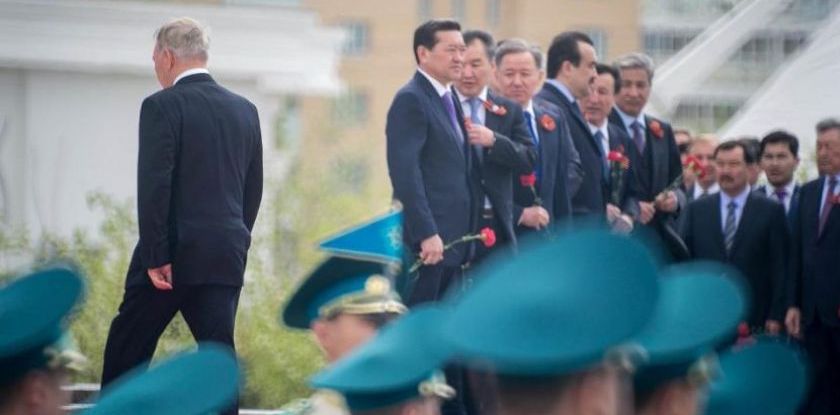The citizens of Kazakhstan are enduring yet another critical period of their country’s history. We can see it from the mere fact that the 25th anniversary of Kazakhstan’s independence was celebrated officially but not publicly and was overshadowed by many unpleasant incidents.
The economic and social problems of the very basic “empty fridge” nature are coming to the forefront in Kazakhstan. However, the current administration has neither resources nor abilities to solve them. All the social groups in Kazakhstan, including the ruling elite, acknowledge this fact. Consequentially, the efficiency of the state policy has not just fallen to zero, it has gotten a negative value. Therefore, the question of choice has now become pivotal. This is the choice that must be made by everyone – the politically and socially active citizens as well as those who are just surviving. The consequences of this choice may vary – from terrorist attacks to the passive ignoring of the state, society, events.
It is obvious that, due to the underpopulation and the social and economic inertia, this critical period will stretch into decades. At the same time, the question of change (fall) of the political regime, however crucial for Nursultan Nazarbayev, his circle and successors, is really of secondary importance. The future changes in economy and society are much more significant. The question is whether they will be timely, sufficient and enable the country to meet competition in this world.
Much to our regret, so far, the prospects for Kazakhstan and its citizens do not seem too bright. And this has nothing to do with its location in the center of the Eurasian continent, between the authoritarian Russia and the communist China. The root of the problem is in the country’s own internal weaknesses. The list of those is too long to be discussed in a single article. Thus, here we will address just one of them, the impotence (failure) of the ruling elite. We are not going to attempt to prove this thesis. We simply recommend to consider the neighbors of Kazakhstan – Russia and China.
Despite all their internal and external problems, the magnitude of the new grounds these two countries have broken during the last decade was impossible to predict. Russia has returned to the world politics as one of its central influences, China has transformed into a state capable of competing with the US. It is another matter that the price for these achievements may be too high. However, it is an undeniable fact that the Russian and the Chinese elites, apart from concerning themselves with their private matters, are successfully solving the national problems as well.
In Kazakhstan, the ruling elite has never matured. The reasons for that are mostly internal. This “super-managed democracy” is based on the obligatory everyday practice of the divide and rule policy. And this practice lays over the clan system that has de-facto stayed untouchable since before the revolution, the incompletion of original capital accumulation, the semi-market nature of the economy, the social inertia, the decreased level of education.
Consequently, Kazakhstan does not have a high-grade elite, in other words, a social group that does not merely exist on the vertex of the consumer pyramid but also governs the country, its economy, social development and makes political decisions. Not surprisingly, the state apparatus and the political hierarchy have been declining together with their “architect”. Thus, the first post-Soviet successes, when, in terms of the pace, quality and depth of the reforms, the Republic of Kazakhstan was outperforming that same Russia, had long sank into oblivion.
The trouble is that, even if Nazarbayev leaves (even the “leaders of the nations” are perishable), we greatly doubt that his successor(s) will be able to change anything. They will first have to address their private matters such as how to keep the supreme political power, suppress their inter-elite adversaries (competitors, ill-wishers), redistribute the property in accordance with the new power balance in Akorda, retain political stability, etc.
Therefore, it is not worth the trouble to expect that the current ruling elite will be able to offer a workable solution on how to resolve the system-based crisis, receive the citizens’ support and successfully execute their intentions. Moreover, it does not necessarily mean that the current political system will keep, especially if we think in decades, not just in years. This means that the ruling elite, most probably, will be drastically transformed, may be even replaced due to certain revolutionary processes that can be initiated from the below as well as from the above.
In these conditions, perhaps, the flow of suggestions on what can be done in the country becomes the only effective way of action for the Kazakhstan’s civic society (or what is left of it). Despite the Kazakh political traditions, there are still those state officials who care, who are brave enough to rebel against the existing order. Obviously, there is a great difference between a spoken word and an executed action. However, thanks to the Internet and social networks, we have a possibility to at least form an opinion, if not come to a consensus. And this public opinion, however discordant, disintegrate, disputable, is of paramount importance.
As we have mentioned in the beginning, in the situation of the system-based crisis – political, economic, social, ideological, etc. – all the citizens of Kazakhstan, without exception, must participate in the decision-making process. And if people cannot establish political parties and nongovernmental agencies that unite them and speak for them due to the state pushback, no one can prohibit them from talking and finding common grounds on the Internet. Thus, when the time come, a Word will become an Action.
*Photo taken from Respublika archives.




